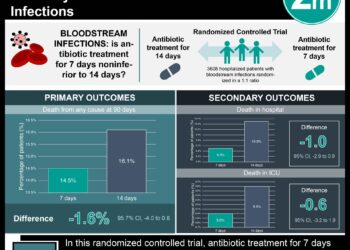Point of care C-reactive protein testing may be useful in guiding antibiotic prescribing
1. C-reactive protein (CRP)-point-of-care tests can be used to guide antibiotic prescribing in primary care for patients with acute exacerbations of COPD with no reduction in patient outcome
Evidence Rating Level: 1 (Excellent)
About 80% of patients presenting with acute exacerbations of chronic obstructive pulmonary disease (AECOPD) to primary care are often given antibiotics that confer no benefits, waste resources, promote antibiotic resistance, and can harm patients. Antibiotic prescription for AECOPD patients is typically decided based on clinical features alone. This study aimed to assess the effect of a C-reactive protein (CRP) point-of-care test (POCT to guide antibiotic prescribing in primary care. The study used the individually randomized and controlled PACE trial in the UK which assigned 324 and 325 participants to receive usual-care or CRP-guided care respectively. The primary outcomes were patient-reported antibiotic consumption for AECOPD within 4 weeks post-randomization and COPD health status assessed by the Clinical COPD Questionnaire (CCQ) at 2 weeks post-randomization. Additionally, the economic burden of each treatment arm was analyzed. In the CRP-guided group, 47.7% of patients were given antibiotics after testing compared to 69.4% in the usual-care group with the most common antibiotics being amoxicillin (59.5%), doxycycline (24.0%) and clarithromycin (12.8%). Interestingly, the participants who received antibiotics in the CRP-guided group received 0.21 more prescriptions on average and more expensive antibiotic formulations. Comparing oral corticosteroids and inhaled medications showed no difference between the groups. Total COPD-related healthcare costs were not significant between groups (p = 0.505). Clinical outcomes showed no difference in QALYs gained over the 6-month treatment period. The odds of consuming an antibiotic for AECOPD was 69% lower in the CRP-guided group compared to usual care (adjusted OR=0.31; 95% CI 0.20 to 0.47; p<0.001). Therefore, CRP-POCT is a cost-effective intervention to reduce antibiotic prescriptions for patients with AECOPD.
Click to read the study in BMJ Open
Image: PD
©2024 2 Minute Medicine, Inc. All rights reserved. No works may be reproduced without expressed written consent from 2 Minute Medicine, Inc. Inquire about licensing here. No article should be construed as medical advice and is not intended as such by the authors or by 2 Minute Medicine, Inc.





